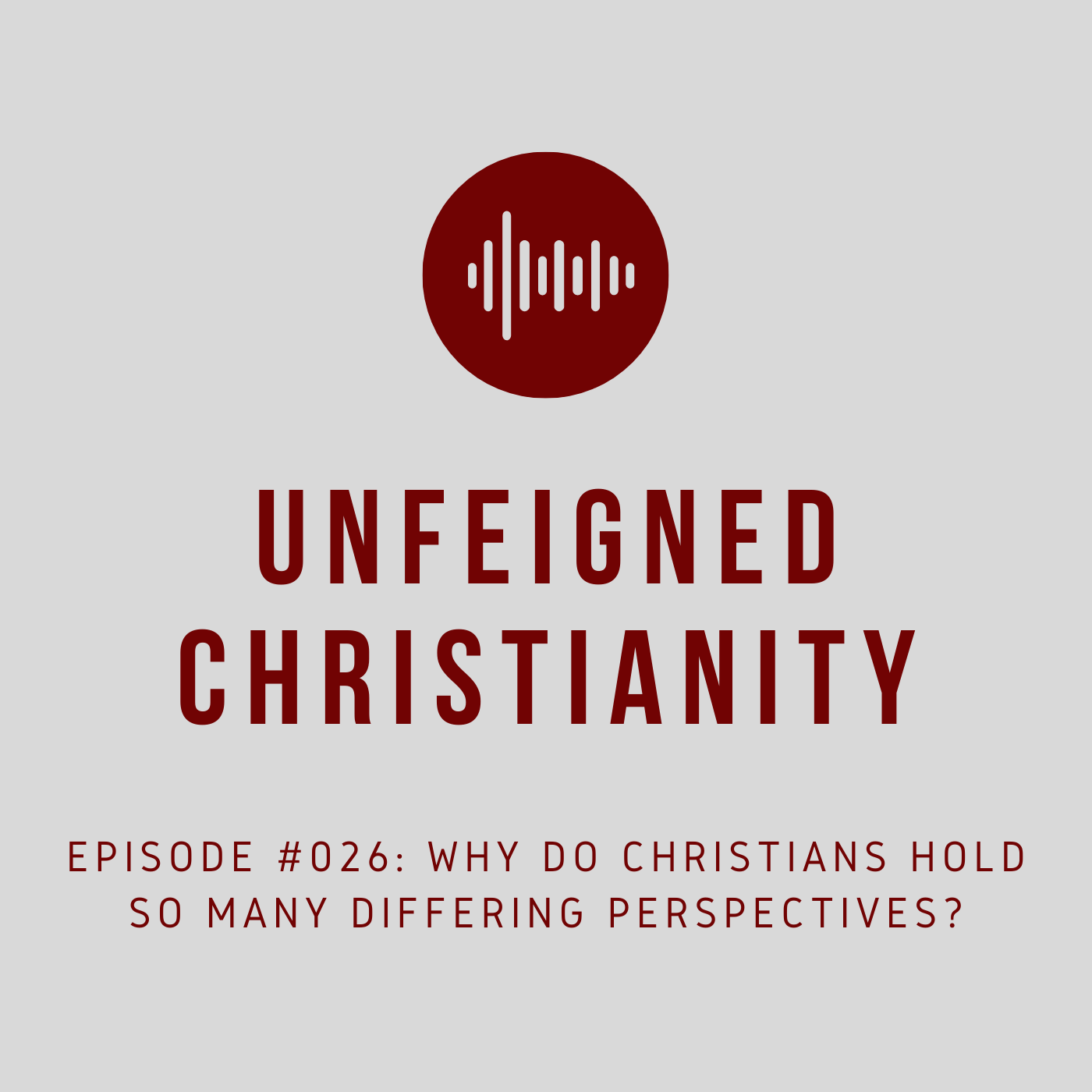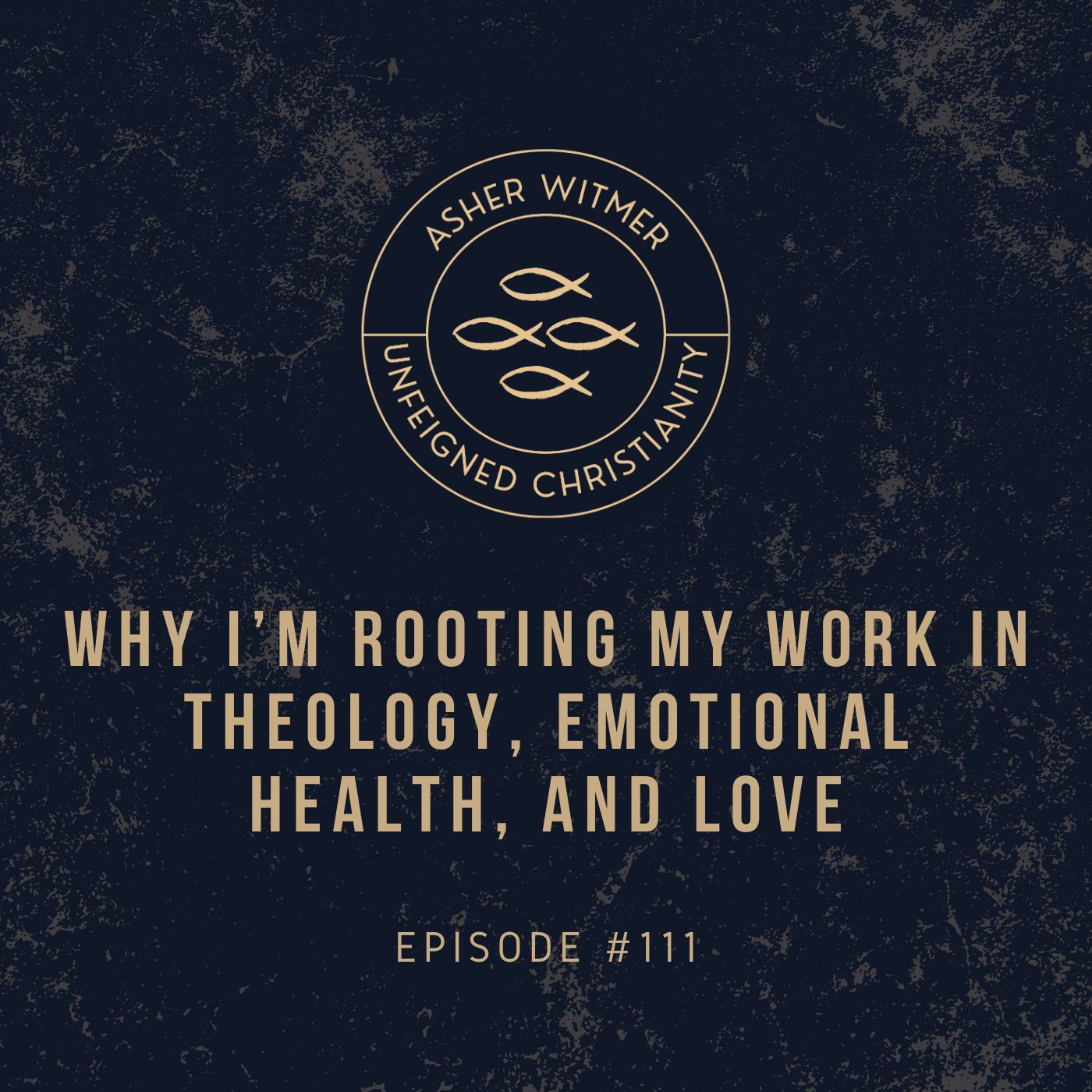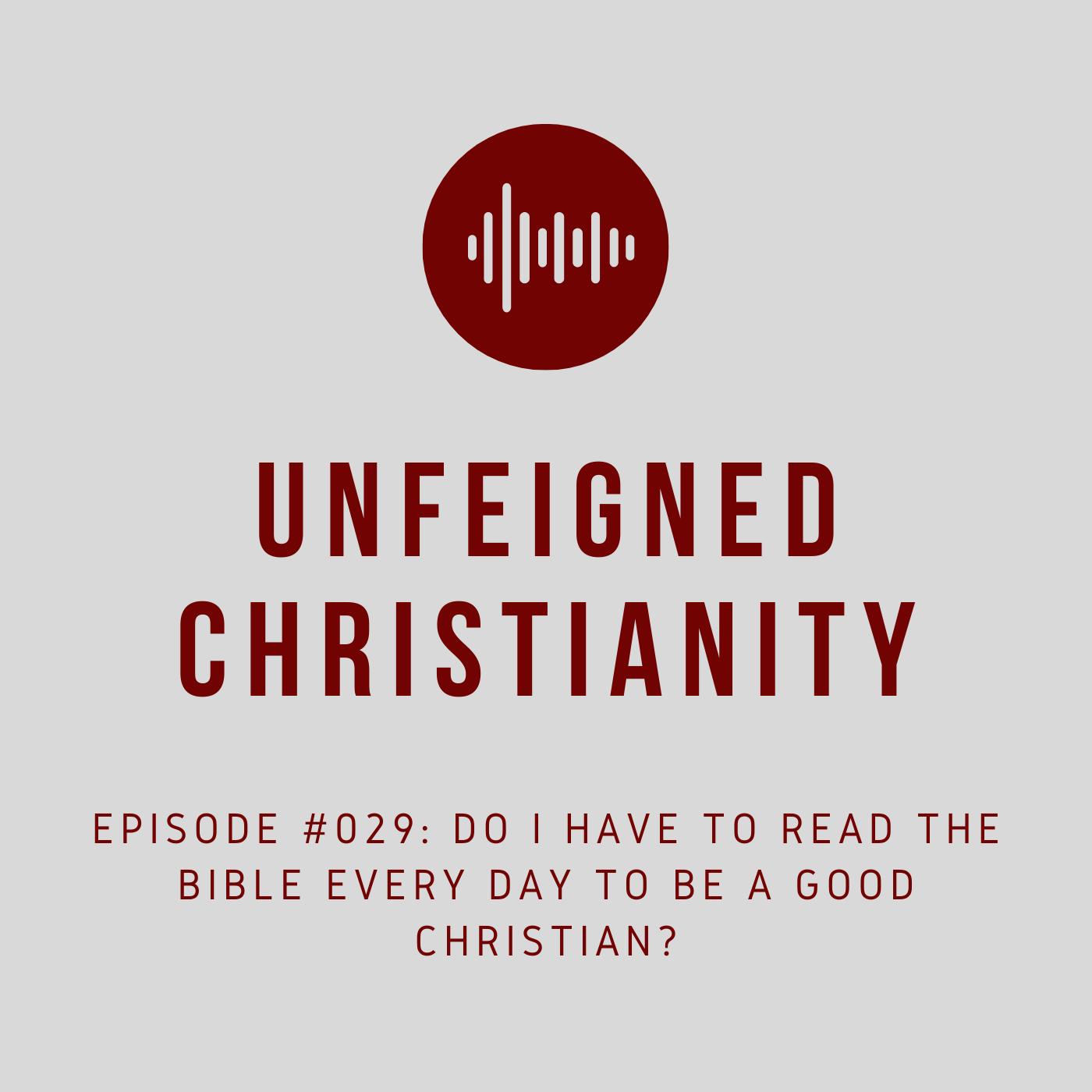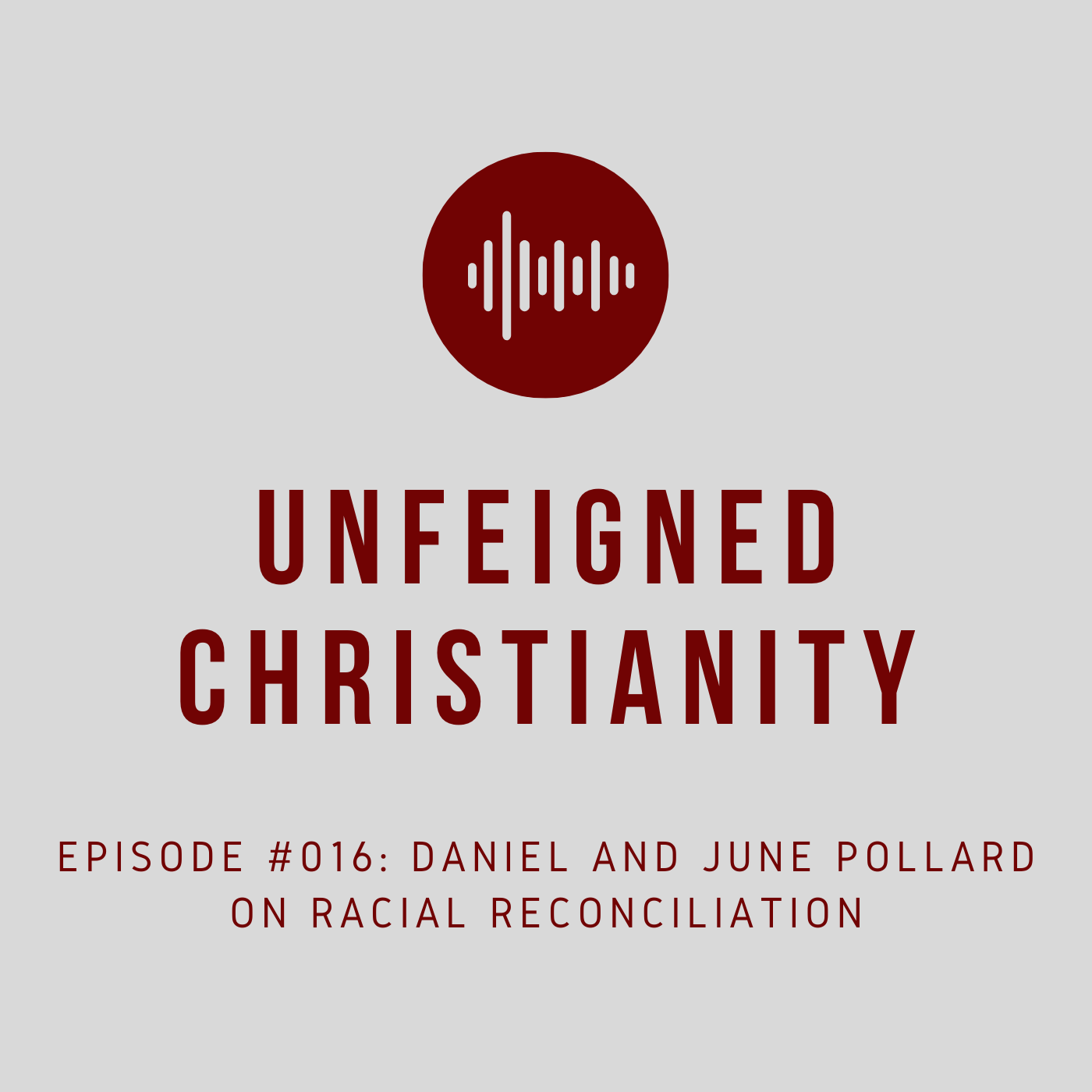Speaker 1 00:00:20 Welcome to season three of unfeigned Christianity, where we are reconciling our human experiences with God and his word. So we could love from a pure heart, a good conscience and sincere faith. Happy new year. It's good to be back. Obviously, if you've been paying attention, you will notice that we haven't been on here for a long while. It's actually been about a year. The last unfeigned Christianity episode was released in January of 2021. And it's been a fairly big big year for myself, personally, for my wife and family. There's been different things that have gone on this year. We did quite a bit of traveling. Some of you would get to see a visit personally in the summer. So the podcast has just been on a one-year hiatus this whole time, pretty much, but I'm excited to bring it back. I'm looking forward to some of the guests that I have already interviewed are scheduled to come on.
Speaker 1 00:01:17 Uh, immediately here we have many series coming up on how to read the Bible. I have several great interviews with a couple of former profs of mine about how to read the old Testament book of revelation, Lucy Kinzinger. Some of you might know. She recently came out with a book, turtle heart, and I'm going to be interviewing her as well. I had a great conversation with a couple of friends on how Christians should think about same-sex attraction and many other great things in store for this season. I'm looking forward to jumping back into podcasting here, and I hope you find it helpful and beneficial for your journey. Your walk with God as well. If you are not already subscribed, please do subscribe that way. You can be sure to be notified. Anytime a new episode drops also subscribe to the YouTube channel. We are going to be publishing as I think we were doing this before publishing the video version of each of these episodes as well.
Speaker 1 00:02:12 Also subscribe to our email
[email protected]. Also in the description of this episode, you will see where you can sign up for the email list and you'll be notified of any new articles or resources for podcasts episodes that that dropped are made available as well. We are making all of our episodes now available audio, video, and transcript. If you prefer to read, if you prefer skimming or something like that, this podcast is made possible through our members at unfeigned Christianity on Patrion as a paid subscriber to unfeigned Christianity, you get expanded versions of all our podcasts interviews. So believe it or not. I recently did an episode with my, one of my profs on specifically looking at how to read the old Testament old Testament law or to some old Testament prophecy. And just, how does it connect with the new Testament as well? And the whole interview took close to two hours, but I'm going to be keeping all the episodes within an hour, hour and a quarter on here, just straight up for free at unfeigned Christianity podcast, but paying subscribers get the whole thing they get the whole hour and 40 minutes, I think it was.
Speaker 1 00:03:25 And so we just took out the whole section talking about how to read old Testament law and how to read biblical prophecy. And that will be available for those who are paying subscribers. And the rest of you will just hear the conversation on how to read the old Testament and how it connects to the new Testament. So that's one of the things you get as a paid subscriber. Another thing is twice a month, you will receive deep dive essays into human experiences. We find uniquely difficult to reconcile with God in his word. So, uh, things like deconstruction, um, things like what's up with the head covering. Those are the kinds of deep dive essays we're going to be getting into as, uh, for those a part of the paid subscription to become a member, just visit www.asherwhitmer.com forward slash member
Speaker 1 00:04:32 There are so many different perspectives among Christians these days. Have you noticed that our church recently was gifted a building to begin meeting in and we had to work through how to handle COVID protocols for indoor gatherings. Um, many of you might not know, but we, we have a small house church. That's kind of the model here in Los Angeles. Our church is called LA road stands for real life opportunities and discipleship. And for years we have met in homes or in the park and when COVID hit, it was just very natural just to keep meeting in the park. Obviously we couldn't meet indoors anymore in homes and here in Southern California, it is typically pretty nice all year round last year. Um, normally in the winters, we do have some rain, some cool weather. It's raining today. As I'm shooting this episode, recording this episode, but last year we didn't receive any rain on Sunday until may.
Speaker 1 00:05:24 We went through the whole winter. It was beautiful weather. It was such a gift from God, but now we've also received a gift in that we, we are being given a building to use for free. We are donating to them. We're, we're helping out with repairs and stuff. However we can. Um, we also are our church, different ones in our church are involved in a school and the school is able to meet in the upstairs of this building for free. They are expecting nothing, uh, from us as far as payment, we are paying them to help out. It's a tremendous gift, but one of the things we bumped into as a church is now that we're meeting in doors, how are we going to handle COVID? Um, here in Los Angeles, there have been fairly strict COVID protocols and they're, they're not, it doesn't make it impossible to continue meeting or continue doing life, but it is inconvenient in many ways.
Speaker 1 00:06:16 And, and we bumped into the reality that in a small, even though we're not a whole lot more than 30, 40 people, we still have many different perspectives on how to handle COVID. Some Christians think the church should address issues like racial injustice while others think it's not a big deal. And being woke is buying into a false religion. Some Christians think you should get vaccinated. Others do not. But even before all these big in your face disagreements that we've had come up in the last couple of years, there have always been many different perspectives within the Christian, the Christian tradition. How do you handle the head covering divorce and remarriage baptism gifts of the spirit use of contraceptions and so on and so forth. Many things to disagree on many things that, that we've had different perspectives on. If we believe in the same God, if we all agree that God is perfectly revealed in Jesus. And if we all believe that the Bible is God's message to us about Jesus, why do we see things so differently? Why does that happen in this episode? I'd like to give you four reasons. There are others. I'm sure, perhaps more obvious reasons, even that cause different perspective and differences among us. But I think these four are sometimes rather subtle and we don't always see them yet. They're very impactful. Maybe you've noticed them. Maybe not.
Speaker 1 00:07:50 The first reason is that we are all shaped by our history more than we realize even. So just a couple examples, but I mean, you can pause and think about that and probably think of many things in your past and your history, that impact how you look at the world and how you think about things. Even as a Christian, even separate from other Christians, you know, your history has shaped you. And just some examples of this is our upbringing shape us. We have different familial history. We have different family traditions, different ways of doing things as a family. Um, one vivid example that I had when I was about 18, 19 years old, when I went to, um, Bible school for the first time, here's a family tradition of ours. We would go through high school and right out of high school, it was kind of encouraged.
Speaker 1 00:08:39 It was never required, but it was just encouraged that, Hey, go spend some time. In some Bible training, it can be a collegiate level Bible college, or it could just be an unaccredited Bible school. And, uh, I think all of my siblings had done some of that. Maybe not necessarily right out of high school, but we've all at some point taken at least two months, six weeks worth of Bible school. And I went in 2010. I went to Sharon Mennonite Bible Institute, which is based in Pennsylvania. And I went to for two terms there and I took, I think, two classes each term. So four classes total saying choir. We went on choir tour as well. And I just remember being a little bit like a fish out of water there at the beginning, I grew up in Northern Minnesota. There's not very many Mennonites up there and go to Pennsylvania.
Speaker 1 00:09:31 There's all kinds of Mennonites everywhere. And it was a little, it was fun. It was, I enjoyed expanding my social horizons, but one of the, one of the things I bumped into is I had a friend who told me about a guy that they worked with or did some workforce something. I can't remember the details. And he talked about how he claimed to be a Christian, and yet he's not really following Jesus in his daily life. And, and then later, a couple months later, maybe, maybe a year later. So I went and visited them and met this friend that he was talking about. And the guy found out that I was involved in a church plant. My family was involved in a church plant out in Los Angeles. And he was really intrigued with that. He asked a lot of questions about it and he talked about what he's doing with his church.
Speaker 1 00:10:14 And, and I realized this, this, this guy has a relationship with Jesus he's. He cares about the work of God. And, and I was kind of blown away. That's not what I was expecting. This is all very subtle. I wasn't, I didn't come here to visit this man and interrogate his walk with God. But I just realized that what my friend had been calling a faithful relationship with Jesus was more, he wasn't walking the Mennonite road and he may be even used to be Mennonite. And he left the Mennonite tradition. And so growing up in a world where I interacted with non Mennonites all the time, my family had non Mennonite friends. My parents would, would regularly work with other pastors throughout the city. So that's an example, just a small example, I guess, of how our upbringings are so different. And another thing that we might not always realize, and this plays into a little bit what I just mentioned, but Christians today in the west, especially, but even all around the world, we come from pretty distinct branches of Christianity that have been shaped over the last 500 years or so from, since the reformation.
Speaker 1 00:11:23 And obviously there's, there's many different brands of Protestant Christianity, and even within the Catholic church and the Orthodox church, there's, there's a few different versions of that as well. But things have generally kind of all go back to the reformation that general time period, the divisions that have happened happened for pretty, uh, inflamed inflammatory reasons, I guess like they, they were tense divisions that took place at the time. And even obviously, even today, we still have some tense divisions, but in many ways, we're, we're kind of a lot more peaceful. I mean, back at the time of the reformation, you had people killing each other because they didn't view the Bible quite the same way. And obviously those involved in the radical reformation did not, did not embrace the violence, did not embrace the state protection as a way of, of maintaining the safety of their church tradition.
Speaker 1 00:12:14 But my point is that our history shapes us. We have been drastically shaped by history perhaps more than we even realize. The second reason that causes a lot of differences among Christians is that we look to different sources for information. And obviously I think we've all become aware of that in many ways. Some people never use mainstream sources, others use mainstream sources while realizing their bias. Others use social media, and don't really think about where it's coming from. They just see different things floating around on social media feeds and just assume, Hey, this is a piece of news and it's true. And some people do not trust academia or science. And so they re they're very suspicious of what is said by people like Dr. Fowchee or any, any buddy in many ways, they're suspicious of things like the vaccine or other people do trust science and academia, and they, they don't understand or can't fathom why you wouldn't.
Speaker 1 00:13:12 And so we clash a third reason why we have so many differences is that we live in drastically different settings. You think of the rural versus urban differences. One thing about the urban setting is you do bump into more cultures and that's, that's another different setting is some of us live in multicultural areas. And so we're constantly affronted with all the different ways of thinking about the world and looking at things others live in more mono-ethnic centers. And you can actually, even in the city, LA has distinct pockets of different ethnicities. And so if all you do is stay within that pocket, like your, you can still kind of fall into a monolithic community, but in the urban setting, you, you are forced to confront the reality that the world is made up of in my city is made up of many different kinds of people than just me.
Speaker 1 00:14:05 We all know that we all know that in our heads, but it's a little different when, when you bump into it firsthand and it's like, whoa, this, wow, that's really different. I never would think of things that way. At least our awareness of how different the world is is there. We may not quite understand it and even, even have a sensitivity to cultural dynamics, but we have an awareness there, the fourth reason, and this is one that probably burdens me the most is a lot of us know stories in the Bible. More than we know the message of the Bible. We can turn to sections of the Bible, that address particular topics that we want look at, but we don't always know the common core threads of the narrative of scripture. There's a stat out there. Um, I failed to cite where I got this.
Speaker 1 00:15:03 I, I looked it up on the internet, so you could probably do it too. But 33% of high school graduates never read another book. That's crazy. If you think about it, 33%, only 67% of high school graduates ever read another book. And I think it jumps up to like 77%. Uh, I don't have that stat right in front of me, but it's an outrageous percent of college graduates that don't read another book. So obviously of the 67% that do read another book, some of those are only doing so because they went on to go to college. So by ourselves, how many of us are reading other books? Now that doesn't mean that, that 33% of high school graduates doesn't know how to read. They know how to read. They know how to read street signs. They know how to read, uh, ingredients. When they're shopping.
Speaker 1 00:15:57 They know how to re tell, like what is, you know, the hamburger helper and what is oatmeal. Like they can tell the difference between that. Obviously there's probably pictures assisting it, but they can see the words and read them. If they're building something, if they got something from Ikea and they're following the instructions, they can follow the instructions and read just fine. They could even open up a book and read it to you just fine. And you'd never know that they never read another book, but that doesn't make them literate. When we say someone is literate, we say, they're reading, they're reading the latest works of art within that society, within that culture, they're getting to know the nuances in the idioms and the, the turns of phrases and the metaphors that are used. They're becoming very literate in the culture. I wonder how many Christians ever read their Bibles other than for preparing lessons or looking something up?
Speaker 1 00:16:55 I think a lot of us know how to read street signs. We know how to go to the Bible. We know, oh, where does it talk about adultery? Oh, I can turn right. You know, uh, Jesus in Matthew five, Matthew 19 talks about it all three Romans, uh, I'm sorry, first Corinthians five and six. Talk about sexual immorality. So I know how to find that and I can read the street sign and I can, I can kind of parse out what this probably means and get fairly close. We know how to read the Bible in that way. We know how to gain instruction from it. We can even read different Psalms and, and be blessed and encouraged and share them with others. But we do not necessarily know how to read the Bible as a whole cohesive message. And so we lack a literacy in the whole scope of the story and what all God is doing throughout creation.
Speaker 1 00:17:52 And so when it comes to things of justice, when it comes to morality and when it comes to divorce and remarriage, when it comes to abuse, when it comes to how we are to be handling conflicts within the church, like these differences, some of us don't have instincts that have been shaped by the message of the Bible, because we don't know it very well. We have instincts that instead go to some common verses and passages. And we pull on that. My point is that sometimes we have strong differences because we're holding so closely to specific stories or specific teachings, passages letters, and we've lost sight of the whole story. Tell me up on unfeigned Christianity, I'm going to, I'm going to have a mini series on how to read the Bible. We are about to launch in a couple of weeks, we're going to be launching our flagship online course called finding my place in God's story.
Speaker 1 00:18:59 And we wanted to introduce it to all of you with a mini series, be making it available in this format, video, audio, as well as texts for those of you that are skimming. You just want to see like the main points. So this series is going to kind of give us an overall overview of what is the Bible and how do we read it so that we actually are getting out of it, what God intended us to get out of it and that it's doing to our lives, what it was intended, the series is going to cover why it's so hard to get into the Bible. Some paradigm shifts that help us better understand what the Bible of authors intended the Bible to say and how to read the Bible as one coming. I hope you'll join us. It's a four-part series. It's entirely free. It gives you some basic tools for better understanding how you fit into God's story. Subscribe to the podcast, as well as our email list to make sure you don't miss anything. Looking forward to going through this with you and hope you find it helpful and meaningful in your walk with God until next time, grace and peace
Speaker 1 00:20:54 I'm not fake. Christianity is brought to you by our members at Patriot. If you would like to receive in-depth essays into various issues that we as Christians face and how to sort through them in a way that helps us love God and others for pure heart, good conscience and sincere faith, and then consider becoming a member at patron. Along with these deep dive essays, you will receive expanded versions of all our podcasts interviews to learn more about becoming a paid subscriber to Christianity, visit www.asherwhitmer.com forward slash member. And if you'd like to learn more about me, maybe you're not very familiar with who I am and what I do. Just go ahead and visit my website, Asher wimmer.com. That has everything that has my book that has blog articles, various other resources available to check out as well, including two networks. I am currently a part of the first is called the restorative faith collective, where we have conversations around race perspectives and relationships in Anabaptist context at restorative faith, collective.org, as well as the kingdom outposts, where we look at, how do we live as Jesus's nation in the world today, visit www dot kingdom, outpost.org.
Speaker 1 00:22:06 Thanks for listening.




